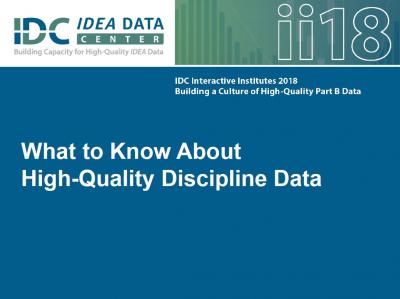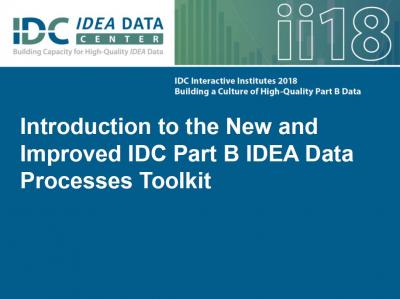Site Search
Results 1 - 4 of 4
Format: Presentations
Data Mining Section 618 Data to Prepare the APRThe required measurements for APR Indicators B3, B4, B5, B6, B9, and B10 (the assessment, discipline, LRE, and disproportionality indicators) are based on Section 618 data. This session focused on selected section 618 data submissions and how the data can be explored to provide more in-depth information for use in discussion with state’s APR stakeholders. Presenters demonstrated some practical methods for taking a deeper look at data in the IDEA EDFacts file submissions using readily available data analysis tools (Microsoft Excel).
Format: Presentations
What to Know About High-Quality Discipline DataThis session reviewed the working principles of high-quality IDEA data as they relate to the various discipline data states must submit each year for children and youth with disabilities. Discussion topics included how states make sure their data are accurate, timely, and complete. Presenters also discussed how states maintain discipline data security while making the data accessible and usable.
Format: Presentations
Introduction to the New and Improved IDC Part B IDEA Data Processes ToolkitThis workshop provided a brief overview of the new IDC IDEA Part B 616 Data Processes Toolkit. Several states that have piloted the toolkit shared their experiences with creating data processes for the SPP/APR indicators, building capacity of data stewards, and instilling a culture of high-quality data. Presenters facilitated discussion that helped participants understand the value of data processes documentation and afforded them an opportunity to experience preparing for and beginning this work.
Format: Presentations
Taking Data Processes Documentation to the Next LevelThis workshop provided participants an opportunity to envision and begin development of a comprehensive plan for creating protocols and follow-up activities they may use at both the SEA and LEA levels. Session activities focused on identifying appropriate roles to be represented at the table. They also focused on methods for engaging staff in the work and other critical considerations for implementing and sustaining these foundational data practices.





